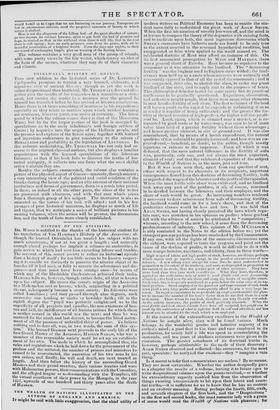THIRLWALCS HISTORY OF GREECE.
Tilts new addition to the historical series of Dr. LARDNER'S Cyclopredia promises to furnish a very learned, elaborate, and ingenious view of ancient Greece; though as yet the work is rather disquisitional than historical. Mr. THIRLWaLs does not al te- gether give the results of his researches in a narrative or a stets- went, but carries the reader in a measure over the ground he himself has travelled before he has arrived at his own conclusions. Hence there is at times something of heaviness in his expositions; especially as they relate to matters upon which neither learning nor acuteness, however great, can arrive at certainty. The latest period to which the volume comes down is that of the Messesdan Wars • but by far the larger portion of the book is occupied by speculations as to the early inhabitants and foreign settlers of Greece; by inquiries into the origin of the Hellenic people, and the persons and exploits of the heroic ages; together with learned and ingenious endeavours to give consistency to the return of HERACLEIDS and probability to the legislation of LYCURGUS. In this arduous undertaking, Mr. THIRLWALL has not only had re- course to the original classical authors, but also displays a familiar acquaintance with the learned speculations of the laborious Germans; so that if his book fails to discover the truths of his- torical antiquity, it collects into one focus what the most skilful critics maintain they are.
Besides the subjects enumerated, the volume also contains a picture of the physical aspect of Greece—masterly, though minute ; a very interesting view of the political and social condition of the Greeks during the heroic age; and an able account of their national institutions and forms of government, down to a much later period. In these, as indeed in all the other parts, the ideas of the writer are presented with clearness, and with that ease which arises from a thorough grasp of his subject. The treatment is als., as animated as the nature of his task will admit ; and in his few passages of pure historical narration, he displays so much of life and vigour, that we anticipate a series of brilliant pictures in his ensuing volumes, when the action will be greater, the discussions less, and the truth of facts more clearly established.


























 Previous page
Previous page